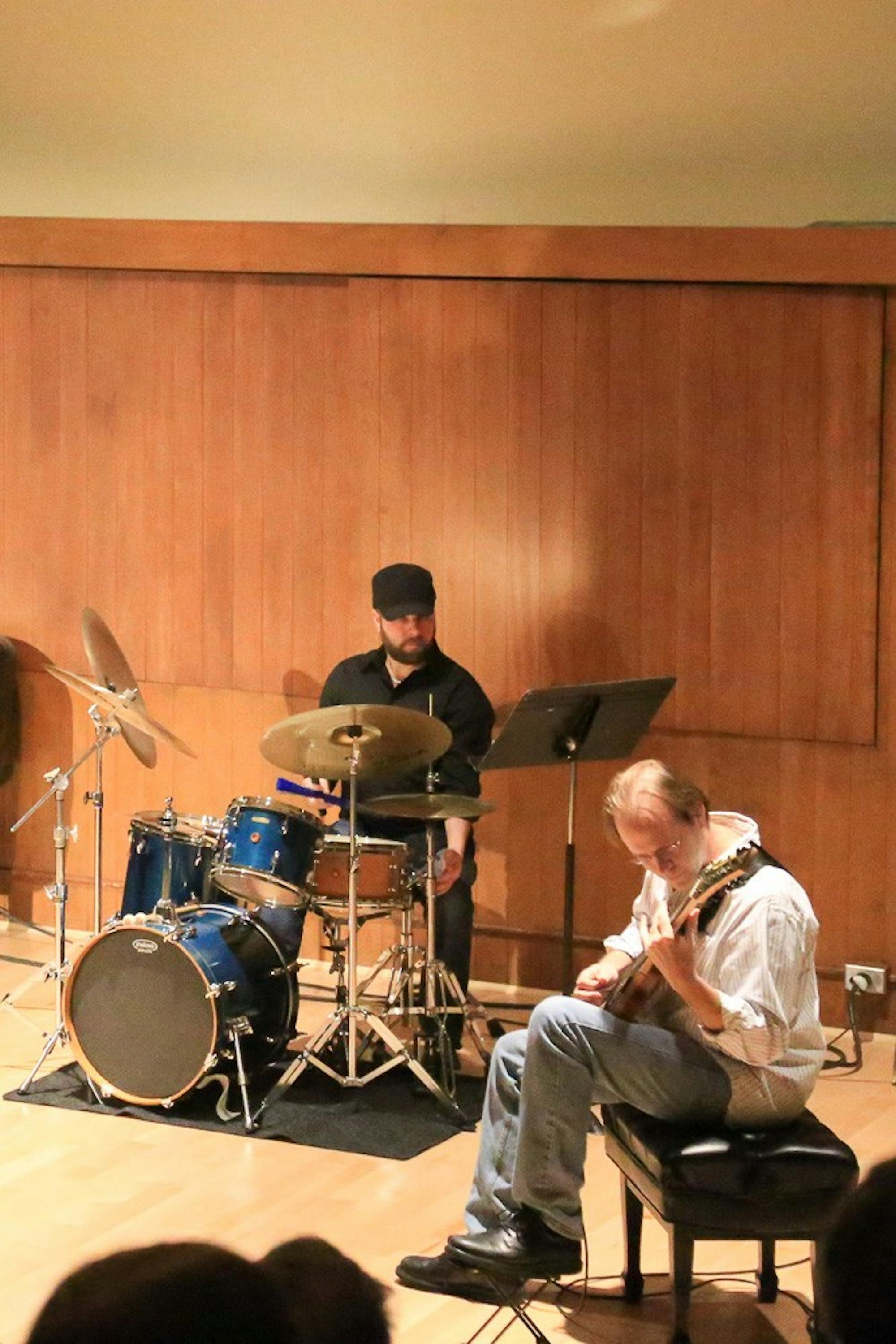Deep bass tones vibrated through Faulkner Recital Hall, paired with the strum of high guitar notes. This partnership was distinct, as both sounds came from the same instrument: music department senior lecturer David Newsam’s eight-string electric guitar.
The eight-string hybrid guitar, which has three bass strings and five guitar strings, is hooked to two different amps. Newsam uses one object to play two different instruments.
The guitar anchored a concert that took place Sunday as part of the Vaughan Recital Series. The featured artists were Newsam, Don Davis and Scott Kinnison.
“The whole point of putting this group together is to use this instrument and have a new take on this repertoire,” Newsam said. “I’m still learning how to play, and it’s fairly new. It’s a bit of a challenge, but it’s been fun.”
The artists have performed together in Manchester, where all three are based.
“The jazz community is pretty small there,” Newsam said. “Everybody kind of knows everybody else.”
Newsam, Davis and Kinnison incorporated an array of instruments on Sunday. The selection included songs by Miles Davis, Bob Marley, Charles Mingus and other artists.
“It’s definitely based in some jazz standards, but it has much more of a high-energy electric guitar edge to it,” Newsam said of their performance. “It’s not all acoustic instruments.”
One particularly beautiful rendition was of W.C. Handy’s “St. Louis Blues,” a song whose history includes performances by America’s top jazz artists, like Louis Armstrong and Wycliffe Gordon.
While the song contains many parts, Davis said, the trio decided to perform only one segment of it.
The song began with the eight-string guitar and a light swoosh in the background from the percussion. Then, Davis entered with the smooth and haunting sound of the woodwinds.
Davis played several wind instruments during the show, occasionally playing multiple instruments in a song.
“The songs we were doing allow flexibility, allowing me to play instruments that I don’t usually play,” Davis said after the show.
The alto saxophone is his instrument of choice, he said.
Davis graduated from Berklee College of Music in Boston, where Newsam also studied. Newsam also works as an assistant professor in the guitar department at Berklee, where he has taught since 1989.
Newsam teaches electric guitar and jazz guitar as an individual instructor at Dartmouth, where he has taught since 1992. He created the jazz guitar program at the University of New Hampshire, where he also teaches.
Davis, Newsam and Kinnison worked together seamlessly, often exchanging jokes between songs. Davis joked that Newsam’s eight-string guitar threw them off sometimes.
“David didn’t mention that his playing that guitar makes us play some things in different keys that were not used to,” he said to the audience.
One of the last songs they played was Don Raye and Gene de Paul’s ballad “You Don’t Know What Love Is.” Davis told the crowd that this was one of his favorite ballads, and encouraged audience members to join in if they wished.
“If you know the words you can sing along to yourself — or out loud,” he said, provoking audience laughter.
Newsam’s powerful sound evoked various moods depending on the song.
“I liked the choice of music, eclectic and interesting, different genres,” audience member Melanie Ditzel said.
The recital ended with “Mercy, Mercy, Mercy,” written in 1966 by Austrian jazz composer Joe Zawinul.
Newsam said that the group sought an interesting mix to complement some standard jazz selections that the members knew.




